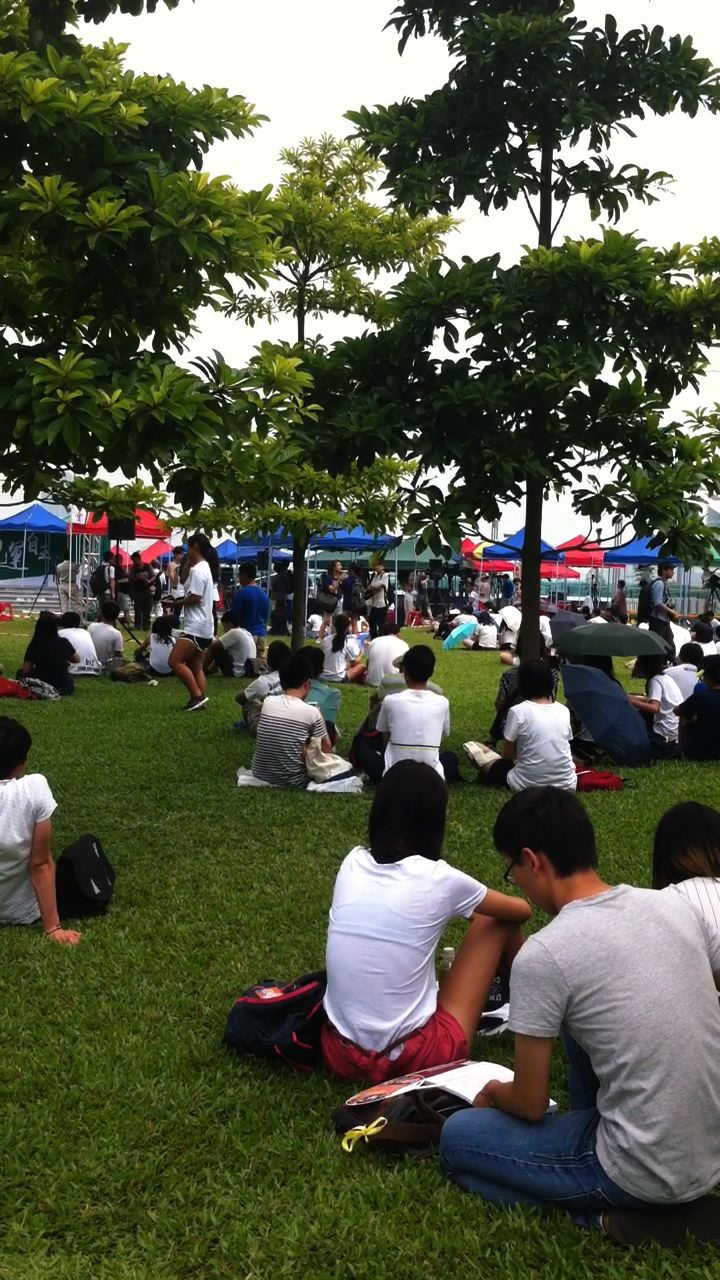
The red, green, blue and yellow tents spread out across the lawn gave the first indication that Tuesday wasn’t just another day at Hong Kong’s Tamar Park. Several hundred students had gathered in the Chinese Special Administrative Region to press their demand for true democracy.
These are some of the thousands of students across Hong Kong who are boycotting classes this week, the latest manifestation of a democracy movement that eyes unfettered elections for the territory’s Chief Executive by 2017. In August, the Chinese government ruled that candidates for the city’s top post must be selected by a nominating committee perceived to serve the Chinese Communist Party.
On Tuesday, banners representing groups from various universities mingled on the lawn, as the emphatic voice of local activist Au Loong-yu blared over a loudspeaker, giving one of several public lectures planned for the week.
Organizers estimated that over a thousand people were in attendance by 1 p.m., although this seemed overly optimistic. “It is still very early, and I believe there will be more people coming,” said Yvonne Leung, a spokesperson for the Hong Kong Federation of Students, which is leading the strike.
The student groups are demanding an audience with Hong Kong’s current Chief Executive Leung Chun-ying. “We have issued an ultimatum to the Chief Executive that if he does not show up to Tamar Park within 48 hours then we will have upgraded actions,” Yvonne Leung said.
Sure enough, there were scuffles later in the day outside the offices of the Chief Executive as students called on him to “honor his election promise.”
For many of those clustered together in the sweltering late-morning heat — some under the colored tents, some under trees, others carrying their own umbrellas — the impetus was a show of solidarity for the future democratization of the city, rather than any immediate impact.
“If we join this campaign for a week it may not affect anything, but it may affect democracy in the future so it’s important for us to come out and show support,” said 21-year-old Lin Ka-kit, who is studying dental surgery at Hong Kong University.
A rally at the Chinese University of Hong Kong on Monday drew over 13,000 people, according to organizer estimates cited by the New York Times. By comparison, Tuesday’s showing was markedly more subdued.
But the student movement is a prelude to a bigger protest planned on Oct. 1 by the larger Occupy Central movement. Protesters have vowed to paralyze the financial heart of the city, although support appears to be dwindling as Beijing has showed no sign of compromising.
“I don’t think we can change the mind of Beijing,” admitted Jacky Cheung, a journalism student at Chu Hai College of Higher Education, “but it’s important to raise awareness and get more people to join the protest.”
More Must-Reads From TIME
- The 100 Most Influential People of 2024
- Coco Gauff Is Playing for Herself Now
- Scenes From Pro-Palestinian Encampments Across U.S. Universities
- 6 Compliments That Land Every Time
- If You're Dating Right Now , You're Brave: Column
- The AI That Could Heal a Divided Internet
- Fallout Is a Brilliant Model for the Future of Video Game Adaptations
- Want Weekly Recs on What to Watch, Read, and More? Sign Up for Worth Your Time
Write to Rishi Iyengar / Hong Kong at rishi.iyengar@timeasia.com